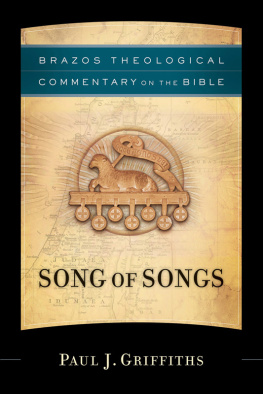This new translation, noteworthy for both its accuracy and its sympathy for Gregorys endeavours, will make his thinking on The Song of Songs far better known. It is extremely welcome.
John Moorhead
McCaughey Professor of History, Emeritus
University of Queensland
Author of Gregory the Great
This is the most exhaustive treatment in modern scholarship for the Commentary on the Song of Songs attributed to St. Gregory the Great and the legacy of that text for medieval exegetes. The careful translation and exhaustive commentary of this overlooked text is an important contribution to Gregorian scholarship and a boon to all those interested in Biblical interpretation during the Middle Ages.
George Demacopoulos
Associate Professor of Historical Theology
Co-Founding Director, Orthodox Christian Studies Program
Fordham University
Anyone wanting to learn pre-modern exegesis by walking through a lively example of it should take firm hold of this book. The accessible translation pays due scholarly attention to the channels through which Gregory came to us (Paterius, Bede, William of St Thierry). Those medieval fans of Gregory on the Song show us what a classic it became, and this should encourage us to see it in the same way. In the full Introduction we are given both a basic primer in figural reading and allegorizing which promoted contemplation, and also a platform for research (not least in footnotes which reflect the state of the question in patristic-medieval exegesis). Priceless!
Mark W. Elliott
Senior Lecturer in Church History, School of Divinity
University of St Andrews
CISTERCIAN STUDIES SERIES: NUMBER TWO HUNDRED FORTY-FOUR
GREGORY THE GREAT
ON THE SONG OF SONGS
Translation and Introduction
by Mark DelCogliano

Cistercian Publications
www.cistercianpublications.org
LITURGICAL PRESS
Collegeville, Minnesota
www.litpress.org
A Cistercian Publications title published by Liturgical Press
Cistercian Publications
Editorial Offices
Abbey of Gethsemani
3642 Monks Road
Trappist, Kentucky 40051
www.cistercianpublications.org
2012 by Order of Saint Benedict, Collegeville, Minnesota. All rights reserved. No part of this book may be reproduced in any form, by print, microfilm, microfiche, mechanical recording, photocopying, translation, or by any other means, known or yet unknown, for any purpose except brief quotations in reviews, without the previous written permission of Liturgical Press, Saint Johns Abbey, PO Box 7500, Collegeville, Minnesota 56321-7500. Printed in the United States of America.

Library of Congress Cataloging-in-Publication Data
Gregory the Great on the Song of Songs / translation and introduction by
Mark DelCogliano.
p. cm. (Cistercian studies series ; no. 244)
Includes bibliographical references and index.
ISBN 978-0-87907-244-5
Ebook ISBN 978-0-87907-769-3
1. Gregory I, Pope, ca. 540604. Expositio in Canticum canticorum.
2. Bible. O.T. Song of SolomonCriticism, interpretation, etc.Early works to 1800. 3. Gregory I, Pope, ca. 540604. I. DelCogliano, Mark. II. Gregory I, Pope, ca. 540604. Expositio in Canticum canticorum.
English. 2012.
BS1485.52.G74 2012
223.907dc23
2011051221
To the Monks of Saint Josephs Abbey
in Spencer, Massachusetts:
fratribus quondam in conversatione,
nunc et semper in Christo
PREFACE
At a certain point in my life I became enamored with the Cistercian Fathers. For a lengthy period I immersed myself in their writings and was deeply affected by their thought, particularly their exegesis of the Song of Songs. Inquisitive about the origins of their ideas, I naturally gravitated toward Gregory the Great, whose influence on the Cistercian Fathers, I learned, was pervasive. In Gregory I found a man of rare humanity and insight whose struggles to integrate the exigencies of his own life with his spiritual aspirations and contemplative ideals so resonated with my own. I was attracted to Gregory because of his utter faith in Christ, because of his honesty about himself and the world he lived in, and above all because of his deep-rooted nobility of soul that pervaded everything he said and did.
The translations that appear in this volume are born of my devotion to Gregory and my desire to share him with others. In his literary corpus Gregory encapsulated the best of patristic theology and spirituality and in so doing bequeathed this rich legacy to generations of Christians who lived after him. Nowhere is this more clearly seen than in Gregorys exegesis of the Song of Songs. Gregorys interpretation of this popular Old Testament book not only owes much to Christian exegetes that preceded him, such as Origen, but also profoundly influenced later Western Latin exegetes of the Song, such as Bernard of Clairvaux. In Gregorys exegesis of the Song of Songs, then, we encounter a recapitulation of the best of what preceded and a harbinger of the riches that were to follow.
This volume includes all that Gregory had to say on the Song of Songs. It is intended as the major sourcebook for anyone with an interest in Gregorys exegesis of this biblical book. Students of patristic and medieval scriptural exegesis will find in this volume the work of a master of the exegetical art whose interpretations are methodologically fascinating, theologically profound, and historically influential. This volume will also be of interest to students of patristic and medieval Christian thought more generally, for Gregory frequently uses the Song of Songs to expound upon some of the classic themes of patristic theology, and Gregorys influence on medieval Christianity is all-encompassing. Those interested in monastic spirituality in general and in Cistercian spirituality in particular will find in this volume the source from which many monastic writers such as Bernard of Clairvaux and William of Saint Thierry developed their own interpretations of the Song of Songs and their own teachings on the spiritual life. Finally, this volume will be of particular interest to students of William of Saint Thierry since it contains a translation of one of the few parts of his corpus that has remained hitherto unavailable in English, thus enabling the evaluation of his thought with more accuracy and greater insight.
As I look back over the decade or so it took for this project to come to fruition, I am awed by the generosity of so many people. Each of the following helped me in a unique way, and I thank each of them: Bernard Bonowitz, OCSO; Timothy Scott, OCSO; Bob Power; Edward Vodoklys, SJ; Gabriel Weaver, OCSO; Peter Schmidt, OCSO; Phillipe Makram, OCSO; and Lewis Ayres. I offer my thanks as well to Basil Pennington, OCSO (R.I.P.); Casimir McCambly, OCSO; Albert James, OCSO; and Maureen McCabe, OCSO, each of whom read an early version of my translation of Gregorys Exposition on the Song of Songs and offered helpful feedback. I would especially like to thank James Palmigiano, OCSO, who for many years undoubtedly heard me talk about Gregory more than anyone else yet never gave a hint of boredom, even when I discussed the intricacies of Gregorys Latinno one could ask for a more supportive, devoted, and caring friend. E. Rozanne Elder was a source of encouragement from the moment I mentioned the project to her, and I wish we could have collaborated until its happy conclusion. Thomas Humphries was my expert reader in the final stages of this project, graciously reading through the entire manuscript and offering constructive criticism. I thank him for his help and wish to add that my own understanding of Gregory has been enriched by reading Gregorys writings together with him during our time at Emory. Karen Levad kindly offered her copyediting services to me, and my prose is more comprehensible because of her careful attention: thank you. I also owe a debt of gratitude to Mark Scott, OCSO, who guided me through the editorial process with care and expertise. I would also like to thank my parents, Edward and Patricia DelCogliano, for their support throughout my life but especially in the last twenty years in which I have made one transition after another. Finally, a thousand thanks to my wife Amy Levad. Though her feminist sensibilities may make her somewhat suspicious of patristic interpretations of the Song of Songs, her love and encouragement have been unwavering.
Next page
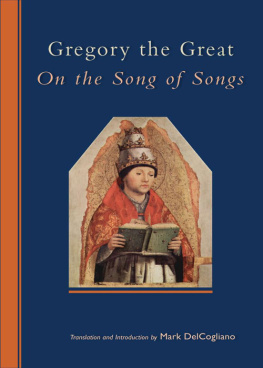




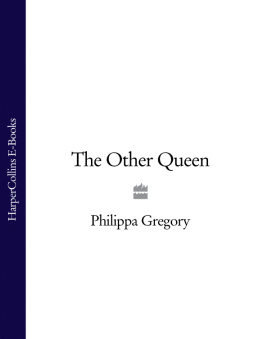


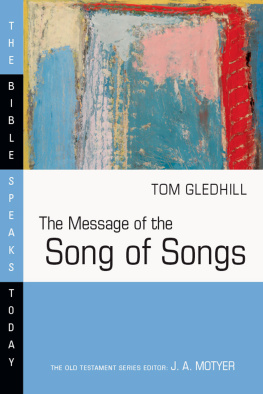


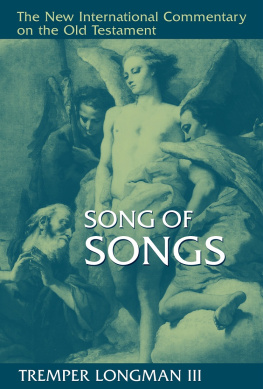
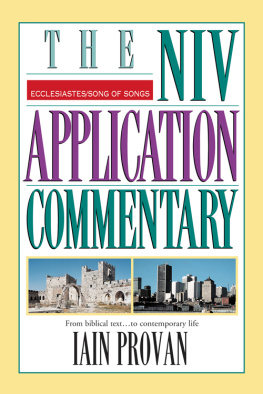

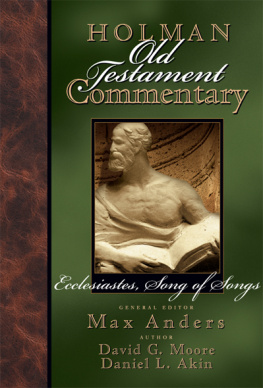
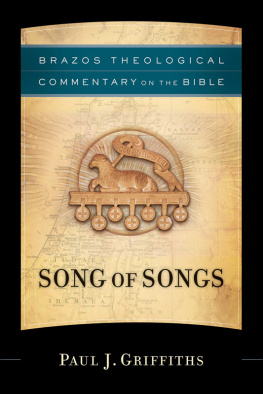
![Othmar Keel - The Song of Songs [Song of Solomon]](/uploads/posts/book/82605/thumbs/othmar-keel-the-song-of-songs-song-of-solomon.jpg)
